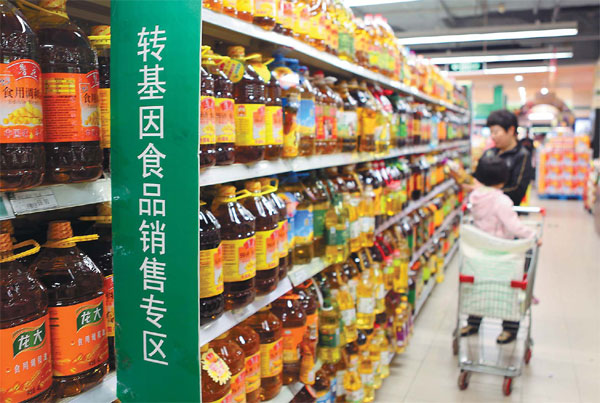
Mandatory GM Food Labeling a Step Closer
Chinese lawmakers began to consider a proposed revision to the country's Food Safety Law on Monday, including mandatory labeling of all goods containing genetically modified organisms. GM food faces hurdle of fears
The draft revision requires GM foods to be labeled according to regulations covering their production and sales processes, but does not specify details of the proposed labeling procedure.
The discussions were part of a session, held every two months, of the National People's Congress Standing Committee. The session will run from Monday to Sunday.
December 23, 2014 | Source: China Daily | by Zhang Yi and Zhong Nan
Chinese lawmakers began to consider a proposed revision to the country's Food Safety Law on Monday, including mandatory labeling of all goods containing genetically modified organisms. GM food faces hurdle of fears
The draft revision requires GM foods to be labeled according to regulations covering their production and sales processes, but does not specify details of the proposed labeling procedure.
The discussions were part of a session, held every two months, of the National People's Congress Standing Committee. The session will run from Monday to Sunday.
The central government has approved imports of GM crops from the United States in an attempt to seek cooperation with Washington in exchange for its go-ahead for more high-tech products to be exported to China.
On Monday, Syngenta, a global agribusiness based in Switzerland that markets seeds and agrochemicals, said it has received a safety certificate from the Chinese Ministry of Agriculture for its Viptera corn, known as MIR 162.
The approval covers corn grain and processing byproducts for food and feed use.
Syngenta's announcement came after Bayer CropScience, based in Germany, said it received approval for its GM soybean variety known as LL55 Liberty Link from Chinese regulatory authorities on Friday.
China has also approved imports of biotech soybeans developed by DuPont Pioneer, the largest US producer of hybrid seeds for agriculture.
China is a key market for the US agricultural seeds business, and accounted for more than half of US soybean exports and 10 percent of corn exports in 2013, according to the US Department of Agriculture.
Li Guoxiang, deputy director of the Chinese Academy of Social Sciences Institute of Rural Development, said China's changing opinion on imports of GM products has been spurred by improved Sino-US political ties.
"The loosening of controls on GM grains by China may lead the US government to lower criteria on the exports of some high-tech products to China," Li said.
Huang Dafang, a biotechnology researcher at the Chinese Academy of Agricultural Sciences, said China already has regulations on the labeling of GM foods, but they are administrative regulations made by regulatory bodies, not laws.
He said the implementation of the labeling regulations remains incomplete due to a lack of clear standards and availability of technical methods.
